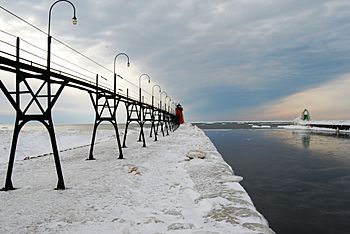Black River (Southwest Michigan) facts for kids
Quick facts for kids Black River |
|
|---|---|

Black River flowing into Lake Michigan
|
|
| Country | United States |
| Physical characteristics | |
| River mouth | Lake Michigan at South Haven, Michigan 581 ft (177 m) |
The Black River is a short river in the U.S. state of Michigan. It flows for about 4.2-mile (6.8 km). The river ends in Lake Michigan at South Haven. Here, its waters pass by the South Pier Lighthouse.
The river gets its name from the dark brown color of its water. This color comes from tiny bits of dirt and plants. These materials are picked up as the river flows. Many animals live in the Black River. You can find trout, snapping turtles, and leeches here. The area around the river is called its watershed. This watershed covers about 287 square miles (740 km2). It spreads across two counties and 13 townships.
Contents
Where Does the Black River Start?
The main part of the Black River forms from two smaller rivers. These are the North Branch Black River and the Middle Branch Black River. They join together northwest of South Haven. A third river, the South Branch Black River, also joins the main river later on.
The North Branch
The North Branch Black River starts from a system of drains. These drains collect water in Allegan County. They flow through areas like Clyde Township and Ganges Township.
The Middle Branch
The Middle Branch Black River begins where two streams meet. These are the Little Bear Lake Drain and Melvin Creek. This happens in southern Lee Township. It is near the border with Van Buren County.
The South Branch
The South Branch Black River also forms from two streams. These are the Lower Jeptha Lake Drain and the Black River Extension Drain. This meeting point is in Columbia Township. It is close to the town of Breedsville.
Branches of the Black River
About three miles (4.8 km) before it reaches Lake Michigan, the river splits. The South Branch drains water from Van Buren County. A bit further upstream, the river splits again. This creates the Middle and North Branches.
The Middle Branch collects water from parts of both Van Buren and Allegan counties. The North Branch watershed is entirely within Allegan County.
What Are Tributaries?
Tributaries are smaller streams or rivers. They flow into a larger river. The Black River has many tributaries. Here are some of the main ones:
- South Branch Black River
- Butternut Creek
- Cedar Creek
- Eastman Creek
- Picture Lake
- Moon Lake
- Merriman Lake
- School Section Lake
- Maple Creek
- Great Bear Lake Drain
- Great Bear Lake
- Max Lake
- Great Bear Lake
* Mill Lake * Munn Lake
-
- Lower Jeptha Lake Drain
- Lower Jeptha Lake
- Upper Jeptha Lake
- Lower Jeptha Lake
- Black River Extension Drain
- South Scott Lake
- Abernathy Lake
- North Scott Lake
- South Scott Lake
- Lower Jeptha Lake Drain
- Middle Branch Black River
- Spicebush Creek
- Scott Creek Drain
- Elm Creek Drain
- Lower Scott Lake
- Upper Scott Lake
- Barber Creek
- Lester Lake
- Mud Lake
- Coffee Lake
- Saddle Lake
- Lester Lake
- Spring Brook
- Spring Brook Lake
- Osterhout Lake
- Melvin Creek
- Deer Lake
- Lake Moriah
- Deer Lake
* Mud Lake
-
- Little Bear Lake Drain
- Lake Eleven
- Lake Fourteen
- Little Bear Lake Drain
- North Branch Black River
- Black River Drain
- Ockford Drain
- Beaver Dam Drain
- North State Road Drain
- Hutchins Lake
- Leverich Drain
- Black River Drain

